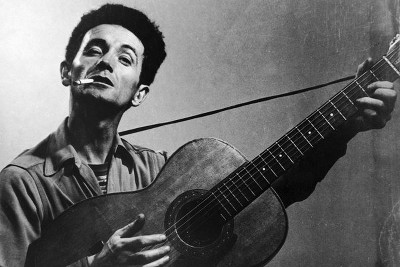| B i o g r a p h y |
 Woodrow Wilson "Woody" Guthrie
(July 14, 1912 - October 3, 1967) was an American singer-songwriter and
folk musician whose musical legacy includes hundreds of political,
traditional and children's songs, ballads and improvised works. He
frequently performed with the slogan This Machine Kills Fascists
displayed on his guitar. His best-known song is "This Land Is Your
Land." Many of his recorded songs are archived in the Library of
Congress. Such songwriters as Bob Dylan, Phil Ochs, Bruce Springsteen,
Robert Hunter, Harry Chapin, John Mellencamp, Pete Seeger, Andy Irvine,
Joe Strummer, Billy Bragg, Jerry Garcia, Jay Farrar, Bob Weir, Jeff
Tweedy, Bob Childers and Tom Paxton have acknowledged Guthrie as a major
influence.
Woodrow Wilson "Woody" Guthrie
(July 14, 1912 - October 3, 1967) was an American singer-songwriter and
folk musician whose musical legacy includes hundreds of political,
traditional and children's songs, ballads and improvised works. He
frequently performed with the slogan This Machine Kills Fascists
displayed on his guitar. His best-known song is "This Land Is Your
Land." Many of his recorded songs are archived in the Library of
Congress. Such songwriters as Bob Dylan, Phil Ochs, Bruce Springsteen,
Robert Hunter, Harry Chapin, John Mellencamp, Pete Seeger, Andy Irvine,
Joe Strummer, Billy Bragg, Jerry Garcia, Jay Farrar, Bob Weir, Jeff
Tweedy, Bob Childers and Tom Paxton have acknowledged Guthrie as a major
influence.
Many of his songs are about his experiences in the Dust Bowl era
during the Great Depression when Guthrie traveled with displaced farmers
from Oklahoma to California and learned their traditional folk and
blues songs, earning him the nickname the "Dust Bowl Troubadour."
Throughout his life Guthrie was associated with United States Communist
groups, though he was seemingly not a member of any. Guthrie was married
three times and fathered eight children, including American folk
musician Arlo Guthrie. Guthrie died from complications of Huntington's
disease, a progressive genetic neurological disorder. During his later
years, in spite of his illness, Guthrie served as a figurehead in the
folk movement, providing inspiration to a generation of new folk
musicians, including mentor relationships with Ramblin' Jack Elliott and
Bob Dylan.
At age 19, Guthrie met and married his first wife, Mary Jennings, with
whom he had three children, Gwendolyn, Sue, and Bill. With the advent of
the Dust Bowl era, Guthrie left Texas, leaving Mary behind, and joined
the thousands of Okies who were migrating to California looking for
work. Many of his songs are concerned with the conditions faced by these
working class people.
Guthrie believed performing his anti-fascist songs and poems at home was
the best use of his talents; Guthrie lobbied the United States Army to
accept him as a USO performer instead of conscripting him as a soldier
in the draft. When Guthrie's attempts failed, his friends Cisco Houston
and Jim Longhi pressured Guthrie to join the U.S. Merchant Marine.
Guthrie followed their advice and went to sea in June 1943 making
voyages in convoys during the Battle of the Atlantic aboard the merchant
ships SS William B. Travis, SS William Floyd, and SS Sea Porpoise. He
served as a mess man and dishwasher and frequently sang for the crew and
troops to buoy their spirits on transatlantic voyages. His first ship
William B. Travis hit a mine in the Mediterranean Sea killing one person
aboard but made it to Bizerte, Tunisia under her own power. His last
ship, Sea Porpoise, took troops from the United States for the D-Day
invasion. Guthrie was aboard when the ship was torpedoed off Utah Beach
by the German submarine U-390 on July 5, 1944, injuring 12 of the crew.
Guthrie was unhurt and the ship stayed afloat to be repaired at
Newcastle upon Tyne in England before returning to the United States in
July 1944. He was an active supporter of the National Maritime Union,
the main union for wartime American sailors. Guthrie wrote songs about
his experience in the Merchant Marine but was never satisfied with the
results. Longhi later wrote about these experiences in his book Woody,
Cisco and Me. The book offers a rare first-hand account of Guthrie
during his Merchant Marine service. In 1945, Guthrie's association with
Communism made him ineligible for further service in the Merchant
Marine, and he was drafted into the U.S. Army.
House of Earth, a long-lost novel written by Guthrie in 1947, was
published on February 5, 2013, by Harper under actor Johnny Depp's
publishing imprint, Infinitum Nihil - Edited by Douglas Brinkley with an
introduction by Johnny Depp. Guthrie apparently was unable to have the
novel published during his lifetime. House of Earth is about a couple
who build a house made of clay and earth to withstand the dust bowl's
brutal weather. The book contains explicit sexual material, which may
have contributed to his inability to get it published.
By the late 1940s, Guthrie's health was declining, and his behavior was
becoming extremely erratic. He received various diagnoses (including
alcoholism and schizophrenia), but in 1952, it was finally determined
that he was suffering from Huntington's disease, a genetic disorder
inherited from his mother. Believing him to be a danger to their
children, Marjorie suggested he return to California without her; they
eventually divorced. During the final few years of his life, Guthrie was
largely alone except for family. Because of the progression of
Huntington's, he was difficult to be around. Guthrie's illness was
essentially untreated, because of a lack of information about the
disease. His death helped raise awareness of the disease and led
Marjorie to help found the Committee to Combat Huntington's Disease,
which became the Huntington's Disease Society of America. None of
Guthrie's three remaining children with Marjorie have developed symptoms
of Huntington's. Mary Guthrie's son Bill died in an auto-train accident
in Pomona, California, at the age of 23. Mary's other children,
Gwendolyn and Sue, suffered from the disease and both died at 41 years
of age.